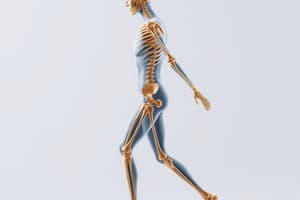Podcast
Questions and Answers
What multiplanar movements does pronation of the foot describe?
What multiplanar movements does pronation of the foot describe?
Eversion, dorsiflexion, and ankle abduction
Stored energy from an efficiently functioning stretch-shortening cycle is released during which muscle action?
Stored energy from an efficiently functioning stretch-shortening cycle is released during which muscle action?
Concentric
The upper trapezius works with what muscle as a force couple to create upward rotation of the scapula?
The upper trapezius works with what muscle as a force couple to create upward rotation of the scapula?
Serratus anterior
What measurement is dependent upon the length of the lever arm and the angle between the force application and the lever arm?
What measurement is dependent upon the length of the lever arm and the angle between the force application and the lever arm?
During a squat, which muscle group isometrically contracts to prevent unnecessary thigh movement in the frontal plane?
During a squat, which muscle group isometrically contracts to prevent unnecessary thigh movement in the frontal plane?
In what plane of movement do shoulder horizontal adduction and abduction occur?
In what plane of movement do shoulder horizontal adduction and abduction occur?
Which muscle functions as part of the global muscular system?
Which muscle functions as part of the global muscular system?
Improved performance during a plyometric jump is dependent upon which of the following?
Improved performance during a plyometric jump is dependent upon which of the following?
Which type of exercise accommodates effort whereby the harder the individual pushes or pulls, the more resistance they feel?
Which type of exercise accommodates effort whereby the harder the individual pushes or pulls, the more resistance they feel?
What type of lever could be described as having a fulcrum in the middle like a seesaw?
What type of lever could be described as having a fulcrum in the middle like a seesaw?
Flashcards are hidden until you start studying
Study Notes
Human Movement Science
- Pronation of the foot involves multiplanar movements including eversion, dorsiflexion, and ankle abduction.
- Stretch-shortening cycle efficiently stores energy released during concentric muscle actions.
- Upper trapezius acts in collaboration with the serratus anterior to achieve upward rotation of the scapula.
- Torque is affected by the length of the lever arm and the angle between the applied force and lever arm.
- During a squat, hip abductors engage isometrically to stabilize the thigh and limit unnecessary lateral movement.
- Shoulder horizontal adduction and abduction take place in the transverse plane of movement.
- The erector spinae is classified as part of the global muscular system, contributing to overall stability and function.
- Performance in plyometric jumps is enhanced by a rapid amortization phase, which minimizes ground contact time.
- Isokinetic exercises provide variable resistance that increases with the effort exerted, while maintaining a constant speed.
- A first class lever features the fulcrum positioned centrally, similar to a seesaw, balancing forces on either side.
Studying That Suits You
Use AI to generate personalized quizzes and flashcards to suit your learning preferences.




